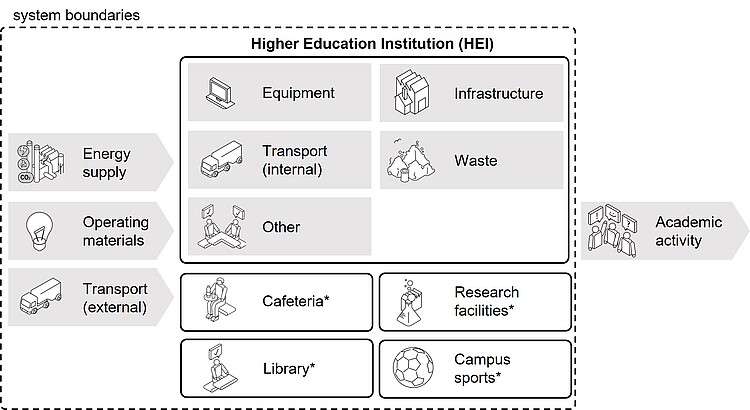Life cycle assessment (LCA) of the Faculty of Mechanical Engineering

| Year: | 2024 |
| Funding: | Study quality funding – „Klimatopf Bau“ of the Leibniz University Hannover |
| Duration: | 12/2024 to 12/2026 |
Conducting a life cycle assessment of the Faculty of Mechanical Engineering at Leibniz University Hannover and deriving an evaluation tool for the ecological savings potential of (construction) measures
Project description
The sustainable development of organisations and universities is a key challenge in view of climate change, finite resources and a growing world population. Against this backdrop, Leibniz University Hannover (LUH) has set itself the goal of becoming climate-neutral by 2031, whereby a well-founded assessment of the university's environmental impact is essential in order to achieve this goal. As part of this project, a comprehensive life cycle assessment is therefore being drawn up for LUH based on current standards. The assessment will not only calculate the university's CO2 emissions, but also identify hotspots and show potential for improvement in (future) measures. The focus is on the development of a standardised methodology for the life cycle analysis of universities, as well as a structured and long-term collection of data within the university. The Faculty of Mechanical Engineering will serve as a pilot, where data will initially be collected and the methodology trialled in a case study. It should then be possible to transfer this to other faculties and organisational units at LUH. The methodology for calculating the environmental impact of universities must fulfil the specific requirements of universities. The balance between face-to-face and online activities, the handling of multifunctional spaces and the integration of the university in different urban or rural contexts are taken into account. Accompanying workshops and information events will be held to sensitise staff and students to the importance of data collection and to create a solid database in the long term. At the same time, an evaluation tool is being developed that can be used to assess (construction) measures in terms of their ecological savings potential. This will allow measures to be prioritised not only on the basis of energy consumption, but also taking into account comprehensive environmental impacts.
The results of the project contribute to the science-based implementation of environmental goals and enable the long-term optimisation of LUH's sustainability strategy. In an international context, the project will strengthen LUH's visibility in the EULiST network and serve as a model for other universities in Europe. Initial collaborations with the University of Iceland and the transfer of the methodology to Queensland University in Australia demonstrate the interest in a global perspective.
Contact persons
Constantin Keul, M. Sc.
keul@ikk.uni-hannover.de
+49 511 762 13156
Venkateshwaran Venkatachalam, M. Sc.
venkatachalam@ikk.uni-hannover.de
+49 511 762 13328
Cooperation partner



(Kopie 6)
Funding



Jürgens et al. 2023 Life cycle assessment of higher education institutions – method and case study, Journal of Cleaner Production, Volume 430, 2023, https://doi.org/10.1016/j.jclepro.2023.139649.




















